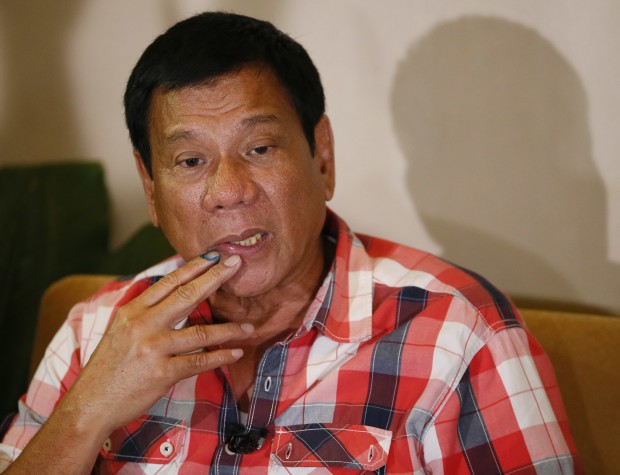
In this Monday, May 9, 2016 photo, front-running presidential candidate Mayor Rodrigo Duterte answers questions from the media during a news conference shortly after voting at his hometown in Davao city in southern Philippines. Philippine lawmakers say Rodrigo Duterte has been elected president and Leni Robredo elected vice president in official vote count. AP
DAGUPAN CITY, Philippines—Aside from drug dealers and criminals, it looks like radio-TV networks have reason to fear a Duterte presidency as well.
Incoming President Rodrigo “Digong” Duterte’s expletive-laden outbursts during live interviews could get networks airing his words into trouble, warned Jojo Solomon, a board member of the Movie and Television Review and Classification Board (MTRCB).
“(Should) the incoming President curse on air, kawalan ng network (the network will be liable),” the MTRCB official said.
While the MTRCB has no control over personalities and celebrities featured in news programs, it has oversight functions over what public affairs programs broadcast every minute of the day, said Solomon who was part of an MTRCB team touring the country to campaign for “intelligent viewership” and to popularize the revised classification rating system for television programs.
‘Bleep!’
“As President, (Duterte) should know the limits of speaking to a television audience … I am sure he knows he should not utter (obscenities),” Solomon added of the Davao official known for letting loose a barrage of expletives and curse words in his everyday speech and media pronouncements.
Manoli Supnet, another MTRCB board member, said network operators are responsible for what goes on air, especially television technicians who should always be on their toes during live public affairs programs.
“They should be alert since they are the ones who control the equipment that ‘bleeps’ out the cuss words uttered by some interview subjects,” she added.
Under the MTRCB’s Guidelines on Language, shows rated G (for general audiences) are not allowed to air swear words, both as verbal or nonverbal expressions. “Profane, offensive and sexually suggestive language or gestures” are not allowed, either.
In programs considered for parental guidance (PG), the MTRCB noted that while shows “may contain mild and infrequent swear words and menacing language,” the successive or frequent use of “strong swear words or sexually derived expletives shall not be allowed.”
A bit of leeway is allowed in programs classified as Restricted or R-13, meant for viewers who must be 13 or older, where “moderate swear words and menacing language consistent with the context of the scene” are allowed. Also allowed is the use of “strong swear words and expletives, provided that its use is infrequent and not vulgar … and all references to sex are suitable to viewers who are at least 13 years old.”
Penalties
In a recent media briefing, Duterte said he intends to control his cursing once he assumes the presidency.
Another MTRCB board member, Manny Buising, warned that “If [Duterte] can’t help himself, it is the network that would be penalized.”
According to Article 201 of “Offenses Against Decency and Good Customs” of the Revised Penal Code, offenders can be meted out the penalty of prision mayor, or imprisonment of from six years and one day to 12 years), or a fine ranging from P6,000 to P12,000, or both fine and prison term.
Buising cited the case of noontime show host Vice Ganda “who sometimes cannot control what comes out of his mouth.”
But every time that happens, the MTRCB official said, “it is not him who meets with us, but the network.”
Added Supnet: “Network owners should self-regulate. We always say that the right of everyone is important and we should not surrender our right to select what should or should not be watched.” Yolanda Sotelo, Inquirer Northern Luzon; and Inquirer Research/TVJ
RELATED STORIES
How do you solve a problem like Duterte?